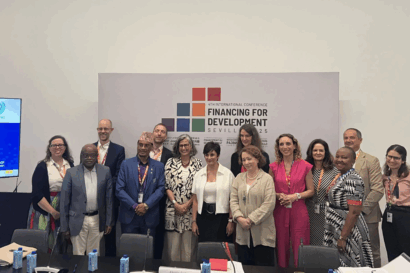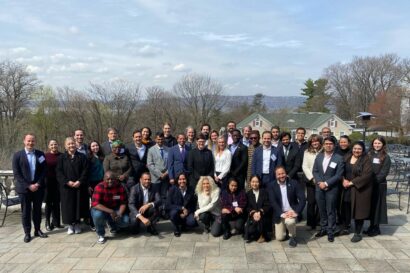Governments’ decisions to grant preferential tax treatments have a direct impact on their ability–or inability–to finance their sustainable development goals. At the Fourth Conference on Financing for Development in June, countries must commit to greater oversight of tax expenditures, including implementing minimum reporting standards and rationalising ineffective or harmful tax expenditures.
Tax expenditures are benefits for eligible taxpayers that reduce the tax they pay and the revenue the government collects. Countries worldwide use tax expenditures to pursue different policy objectives, such as attracting investment, boosting employment, and promoting the energy transition. At the same time, tax expenditures are costly and, when poorly targeted or overly generous, can drain crucial domestic revenues.
According to the Global Tax Expenditures Database (GTED), revenue forgone from tax expenditures lies around 4% of GDP and 25% of tax revenue globally. This has remained relatively stable since 1990, the first year for which the database gathers data. With foreign aid increasingly scarce and debt levels at unprecedented highs in many low-income countries, the need to rationalise tax expenditures as a way to increase domestic resource mobilisation is becoming even more urgent.
The Fourth Conference on Financing for Development (FfD4), where countries will agree on the agenda for development finance for the next decade, is critical for taking this up. In the discussions leading up to the conference, states had agreed on a draft to “commit to increase transparency and improve oversight and management of tax expenditures, and implement minimum standards for tax expenditure reporting” [emphasis added]. However, this has been replaced by a passive suggestion to merely “encourage the enhancement [emphasis added] of oversight” in the latest draft version of the Outcome Document.
This watered-down proposal contradicts the urgency that FfD4 has placed on the need to increase domestic resource mobilisation to resolve developing countries’ financing challenges. At a minimum, negotiators should push for the language from the previous draft to be reinstated in the Outcome Document. There should be a clear commitment to strengthen transparency, oversight, and management of tax expenditures, and implement minimum standards for tax expenditure reporting.
The Outcome Document should also be clear on the purpose of improving oversight of tax expenditures—that is, for countries to have better, more reliable information to rationalise and reform ineffective or harmful tax expenditures. This should be considered the “guiding star” of tax expenditure reporting, which is a means to an end rather than an end in itself.
What should the minimum standards for tax expenditure reporting be?
Reporting is a critical first step toward reforming tax expenditures. Without reliable information on the fiscal impact of tax expenditures and their effects (as well as on the tax expenditure regimes of other countries), it is virtually impossible for governments to make informed decisions about which benefits to remove, adapt, or maintain. Given their magnitude, reporting on tax expenditures helps governments create more reliable revenue forecasts and plan budgets with greater accuracy.
The Global Tax Expenditure Transparency Index (GTETI) provides a comprehensive framework for tax expenditure reporting based on international good practices. The index allows to identify three minimum standards that reports must meet: regularity, transparency, and specificity.
- Regularity means that governments issue tax expenditure reports at regular intervals, ideally linked to the annual budget cycle, so that political decision-makers and stakeholders know when to expect this information and which time span the report is covering. Association with the budget cycle also helps to view them in the context of normal public expenditure.
- Transparency means that governments publish information on all tax expenditures in use, including measures for which revenue forgone has not been, or cannot be, for one reason or another, estimated.
- Specificity means that governments provide information for each individual tax expenditure provision. This includes estimations of revenue forgone along with the policy objective. This level of detail is key to any informed debate about the rationale for tax expenditures.
Member states should commit to implementing these minimum standards to ensure consistency and enhance cross-country comparison of tax expenditure regimes.
What do countries need to implement the FfD4 agenda on tax expenditures?
Building on these commitments and the reporting they are meant to trigger, countries have an opportunity to implement long-term strategies to rationalise tax expenditures. This requires ongoing support and collaboration.
The Platform for Collaboration on Tax has taken an important step by releasing high-level principles for designing and using incentives, which we understand will be complemented by practical tools. But reform takes time. It takes solutions tailored to the local context and hands-on implementation support. It takes many organisations and individuals to join forces, both domestically and internationally.
The International Institute for Sustainable Development, the International Centre for Tax and Development, ODI Global, the Council on Economic Policies, and the German Institute of Development and Sustainability represent an integral part of the tax policy ecosystem. Our organizations regularly engage with low- and middle-income countries in collaborative research and hands-on support on the design, use, impact, and reform of tax expenditures, as one of several tax policy matters. We are proposing a decade of focused action on tax expenditure reform, working closely with the Platform for Collaboration on Tax, and other stakeholders.
A Coalition on Tax Expenditures—made up of think tanks, non-governmental institutions, and academic institutions—would be the start of an inclusive, collaborative effort to design, implement, and monitor tax expenditures more effectively and to ensure that they align with countries’ development goals, protect tax revenues, and promote sustainable growth. The coalition would focus on
- scaling up research and independent technical support to governments on designing, implementing, monitoring and evaluating tax expenditures;
- exchanging expertise and best practices, creating a global knowledge-sharing platform on tax expenditures, building on existing efforts such as the Tax Expenditures Lab and the Community of Practice on Tax Expenditures;
- leveraging complementary strengths from different organisations—be it in legal frameworks, policy evaluation, or economic modelling—to provide holistic support;
- strengthening international momentum, ensuring tax expenditure reforms remain a priority in forums like FfD4 and beyond.
Reforming tax expenditures is critical to freeing up fiscal space for countries to fund development, climate, and biodiversity goals. Countries have a significant opportunity with the FfD4 to forge a collective commitment toward strengthening transparency, oversight, management, reporting, and reform of tax expenditures. A coalition of experts and institutions stands ready to provide the support and resources to help governments turn this commitment into reality.



